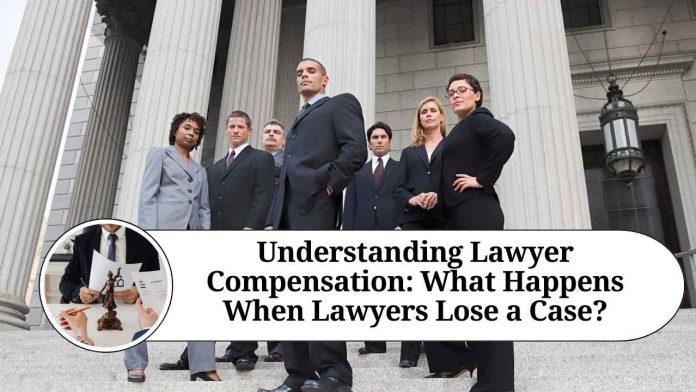The legal profession is often associated with high stakes, intense debates, and the pursuit of justice. Lawyers play a crucial role in advocating for their client’s interests and ensuring that the legal system operates fairly. However, not every case can be won, and lawyers occasionally find themselves on the losing side. This begs the question: How do lawyers get paid if they lose a case? In this blog post, we will explore the different ways lawyers are compensated and what happens when they face an unfavorable outcome.
The Hourly Fee Structure:
One of the most common methods of lawyer compensation is the hourly fee structure. Under this arrangement, lawyers charge clients an agreed-upon hourly rate for their services. Regardless of the outcome of the case, lawyers are typically entitled to be paid for the time they have invested in the matter. This means that even if they lose the case, they will still receive payment for the hours worked.
Contingency Fees:
In certain types of cases, lawyers may work on a contingency fee basis. This arrangement is often seen in personal injury, medical malpractice, or other civil litigation cases. Instead of charging clients an upfront fee, lawyers agree to be paid a percentage of the compensation awarded if they win the case. However, if the case is lost, the lawyer typically does not receive any payment for their services. Contingency fees provide an opportunity for clients who may not have the means to pay for legal representation upfront but still want to pursue a legal claim.
Flat Fees:
For certain legal matters that are relatively straightforward and predictable, lawyers may charge a flat fee. This means that a set amount is agreed upon at the beginning of the case, and the lawyer’s services are compensated accordingly. Regardless of the outcome, the lawyer will receive the agreed-upon fee. Flat fees are commonly used for routine legal tasks such as drafting contracts, creating wills, or handling real estate transactions.
Retainers:
In some cases, clients may be required to pay a retainer fee to secure the services of a lawyer. A retainer is an upfront payment that is held in a client’s trust account and used to cover future legal fees and expenses. Lawyers typically bill against the retainer as they work on the case, deducting their fees and costs as they accrue. If the case is lost, the lawyer may keep the retainer as compensation for the work performed.
Other Arrangements:
Apart from the traditional fee structures mentioned above, lawyers may also negotiate alternative compensation arrangements with their clients. These can include hybrid fee arrangements, where a combination of hourly fees, contingency fees, or flat fees are used. Additionally, pro bono work (voluntary legal services provided without charge) is often undertaken by lawyers to serve the public interest or assist clients in need.
Conclusion
While winning a case is often the desired outcome for lawyers, it is a reality that they may sometimes face defeats in the courtroom. The way lawyers get paid when they lose a case depends on the fee structure agreed upon with their clients. Whether it’s through hourly fees, contingency fees, flat fees, or other arrangements, lawyers are compensated for their time and expertise, irrespective of the outcome. Understanding these payment structures helps shed light on the financial dynamics of the legal profession and the various ways lawyers provide their services to clients.
Read more useful content:
Frequently Ask Questions
Q1: How do lawyers get paid if they lose a case?
A1: The method of payment for lawyers when they lose a case depends on the fee structure agreed upon with the client. If the lawyer charges an hourly fee, they are typically entitled to be paid for the time they invested in the case, regardless of the outcome. In cases where lawyers work on a contingency fee basis, they do not receive any payment if they lose the case. Flat fees and retainers, on the other hand, are usually paid upfront or held in trust, respectively, and are not dependent on the case outcome.
Q2: What is an hourly fee structure?
A2: An hourly fee structure is a common method of lawyer compensation. Lawyers charge clients an agreed-upon hourly rate for their services. Even if the lawyer loses the case, they are typically entitled to be paid for the hours they worked on the matter. The client pays for the lawyer’s time and expertise rather than the result obtained.
Q3: What are contingency fees?
A3: Contingency fees are often used in personal injury, medical malpractice, or other civil litigation cases. Under this arrangement, lawyers agree to be paid a percentage of the compensation awarded if they win the case. However, if the case is lost, the lawyer generally does not receive any payment for their services. Contingency fees allow clients to pursue legal claims without upfront costs, as the lawyer takes on the financial risk.
Q4: How do flat fees work if a lawyer loses the case?
A4: Flat fees are a predetermined amount agreed upon between the lawyer and the client for specific legal services. Regardless of the outcome of the case, the lawyer receives the agreed-upon fee. If the lawyer loses the case, they still keep the flat fee as compensation for the work performed.
Q5: What happens to the retainer fee if a lawyer loses the case?
A5: A retainer fee is an upfront payment made by the client to secure the lawyer’s services. The retainer is held in a trust account and used to cover future legal fees and expenses. As the lawyer works on the case, they bill against the retainer, deducting their fees and costs. If the case is lost, the lawyer may keep the retainer as compensation for the work already performed.
Q6: Are there any other payment arrangements for lawyers if they lose a case?
A6: In addition to the standard fee structures, lawyers may negotiate alternative payment arrangements with their clients. These can include hybrid fee structures that combine elements of hourly fees, contingency fees, or flat fees. Lawyers may also undertake pro bono work, where they provide legal services without charge, often for public interest or to assist clients in need.
Q7: Do lawyers always require payment even if they lose a case?
A7: Lawyers typically charge for their time and expertise regardless of the case outcome, as they invest considerable effort and resources into each matter. However, depending on the fee structure agreed upon, such as contingency fees or pro bono work, they may not receive a payment if they lose the case.
Q8: Can lawyers negotiate different fee arrangements based on the case’s complexity?
A8: Yes, lawyers can negotiate different fee arrangements based on the specific circumstances of a case. Factors such as the complexity, potential risks, and time commitment involved may influence the fee structure. Clients and lawyers need to have open and transparent discussions about fees and payment arrangements before engaging in legal representation.
Q9: What happens if a lawyer wins a case but the client is unable to pay the fees?
A9: In situations where clients are unable to pay the lawyer’s fees, the lawyer may explore alternative solutions, such as setting up a payment plan or negotiating a reduced fee.




















